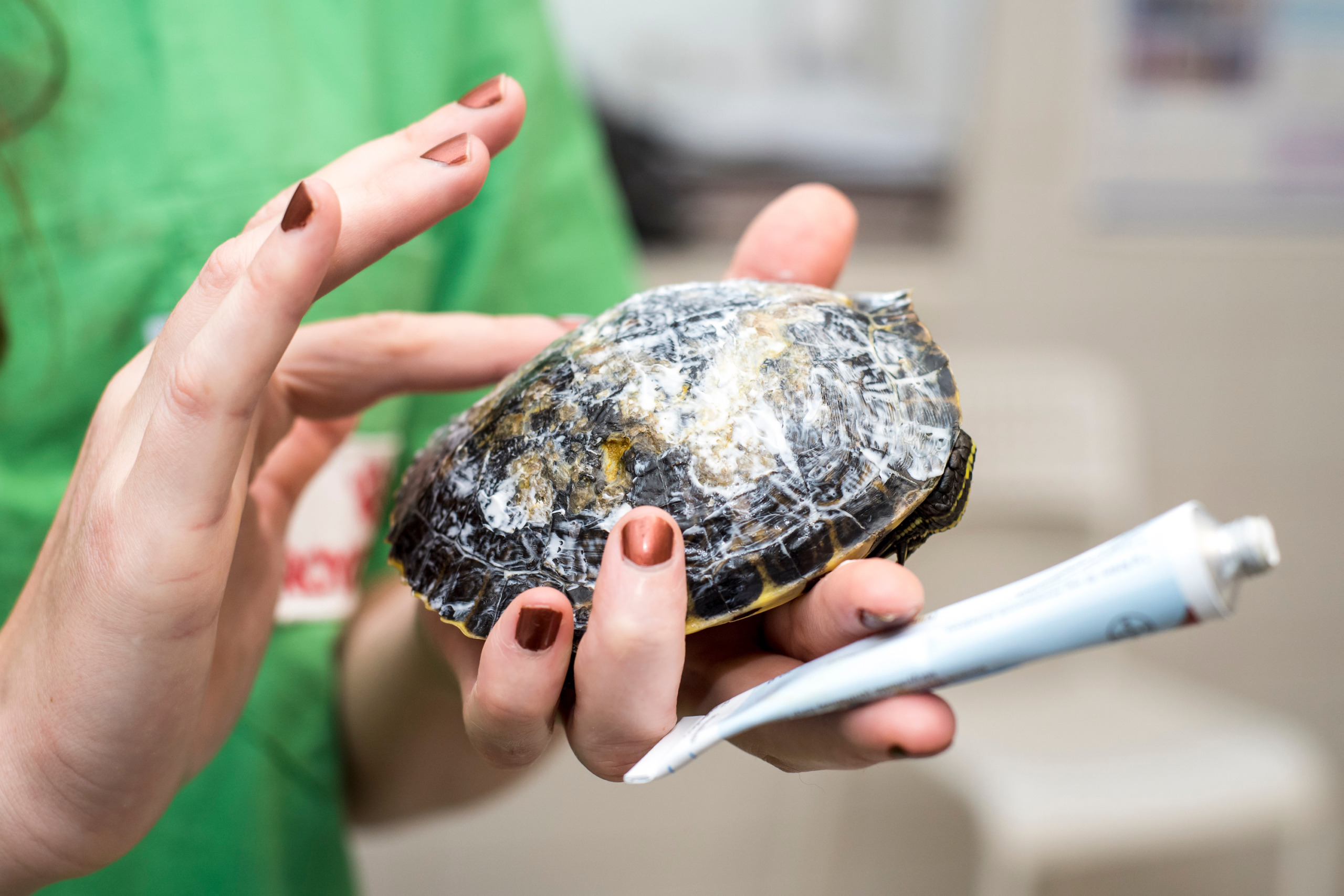To tell if your turtle is sick, look for signs such as lack of appetite, lethargy, and abnormal behavior. If you notice any of these symptoms, it’s important to seek veterinary care immediately.
turtles are fascinating creatures that can make great pets. It’s important to seek veterinary care if you suspect your turtle is ill.
However, just like any other animal, they can fall ill. as a responsible owner, it’s crucial to be able to recognize when your turtle is sick. Knowing what signs to look out for can help you get your pet the care they need, potentially saving their life.
In this article, we will explore the common symptoms that indicate your turtle is unwell. We’ll also provide tips on how to keep your turtle healthy and happy, and steps you can take to prevent illness in the first place. So, let’s dive in and discover what to do if you suspect your turtle is sick.

Recognizing Differences In Appearance
It’s important for turtle owners to recognize when their pet is sick. One sign to look for is abnormal shell texture; it may be soft or have white spots. Unusual coloration is another indicator of illness. If your turtle’s eyes appear sunken and they seem lethargic, they may be in poor health.
Keep an eye on their behavior and if you suspect they are sick, consult with a veterinarian who specializes in exotic pets. Early detection and treatment of illnesses can mean the difference between life and death for your pet.
Physical Symptoms Of Illness
If your turtle exhibits abnormal discharge from the eyes, mouth or nose, it may be sick. Swollen or closed eyes, shell abnormalities like soft spots or discoloration, and the presence of abnormal growths on the body are other symptoms of possible illness.
Difficulty breathing or gasping for air may also indicate that your turtle is unwell. As a responsible pet owner, it is important to be aware of your turtle’s behavior and physical appearance, regularly assessing its health. Take action immediately if you notice any of these unusual symptoms and consult with a veterinarian who specializes in turtle care.
Remember to keep your pet’s environment clean, provide it with proper nutrition and temperature regulation, and give it plenty of room to explore and exercise.

Monitoring Eating Habits And Digestion
To monitor your turtle’s health, it’s crucial to pay attention to their eating habits and digestion. Lack of appetite can indicate sickness, so be aware of any changes in their normal diet. Watch out for irregular or abnormal defecation, as this can also signal an underlying issue.
Vomiting or regurgitation could also indicate a problem and should be closely monitored. Keep note of any changes in your turtle’s behavior and keep an eye out for these symptoms. Prompt veterinary care may be necessary for any concerning signs of sickness.
By monitoring your turtle’s eating and digestion, you can ensure their health and well-being.
Identifying Behavioral Changes
Turtles are fascinating pets to have, but they can also get sick like any other living creature. Identifying behavioral changes is one way to tell if your turtle is fall ill. keep an eye out for increased aggression, unusual hiding or isolation, and unresponsiveness to stimuli.
If your turtle behaves differently than usual, it may be a sign of an underlying health issue. Observe your turtle closely and consult a veterinarian if you suspect it’s sick. Remember, any changes in behavior should not be taken lightly when it comes to keeping your pet happy and healthy.
With proper care and attention, you can ensure that your turtle stays healthy and happy for many years to come.

Assessing Environmental Factors
Assessing environmental factors is a crucial step in determining if your turtle is sick. Inadequate temperature and lighting can cause lethargy, loss of appetite, and respiratory problems. Poor water quality can lead to skin infections and shell rot. Inappropriate tank setup, such as overcrowding and lack of hiding places, can stress your turtle, which can weaken its immune system and make it more susceptible to illness.
Regularly monitoring these factors can prevent health issues and ensure that your turtle stays healthy. Make sure to provide your turtle with proper lighting, heat, and filtration, and maintain a clean tank. If you notice any signs of illness, consult a veterinarian who specializes in reptiles.
Respiratory Infections
A respiratory infection is one of the common health issues that can affect turtles. Some of the common causes of respiratory infections include poor water quality, inadequate basking areas, cold temperatures, or a compromised immune system. It is important to identify symptoms of respiratory infection early on, which includes lethargy, gasping, bubbles from the nose or mouth, and lack of appetite.
If you observe any of these signs, consult a veterinarian promptly. Treatment may include antibiotics, nebulization, or other supportive care. In order to prevent respiratory infections, ensure that your turtle’s environment is kept clean, water is changed regularly, and temperature is maintained at appropriate levels.
With proper care and attention, your turtle can enjoy a long and happy life.

Shell Rot
It is essential to keep a vigilant eye on your turtle’s health. One common illness is shell rot, which can be caused by poor water quality, inadequate basking areas, or physical injury. Additionally, turtles with weakened immune systems are more at risk.
Symptoms of shell rot include soft or discolored shell, a foul odor, and lethargy. Treatment options range from antibiotic injections to topical ointments. It is important to consult with a veterinarian for proper diagnosis and treatment. Regular check-ups and proper husbandry can help prevent turtle illnesses, including shell rot.
Remember to keep a careful eye on your pet, and seek professional help if you suspect anything is amiss.
Parasitic Infestations
Parasitic infestations are a common problem amongst turtles that can quickly become serious if left untreated. Understanding the symptoms of parasitic infestations is essential as it can save your turtle’s life. Common parasites include ticks, mites, tapeworms, and roundworms. Symptoms of parasitic infestations may include weight loss, lethargy, loss of appetite, diarrhea, or unusual lumps and bumps on the skin.
If you suspect your turtle has a parasitic infestation, it’s important to take them to a veterinarian as soon as possible for treatment options. Treatment may include medication, changes to diet, and environmental modifications. By recognizing the symptoms and seeking treatment promptly, you can ensure the health and well-being of your beloved turtle.

Maintaining Proper Tank Conditions
Keeping your turtle healthy is crucial. Temperature and lighting are important. Ensure that their basking area is warm. Uvb lights are necessary for vitamin d synthesis. Water quality is also a crucial factor. Keep the tank clean regularly. Avoid using harsh cleaning agents.
Decorations in the tank should be safe. Sharp objects can cause injuries. Ensure that your turtle has enough space to move around. Follow these tips to maintain optimal tank conditions for a healthy turtle.
Improving Diet And Nutrition
Are you worried that your turtle might be feeling under the weather? Diet and nutrition play a vital role in keeping your pet healthy. Providing your turtle with an appropriate diet that includes a mix of vegetables and protein is essential.
Additionally, some supplements can be added to their food to ensure they receive all the necessary vitamins and minerals. However, it’s crucial to avoid overfeeding your turtle, as overconsumption can lead to obesity and other health issues. Keep a close eye on your pet’s eating habits and consult a veterinarian if you observe any abnormal changes.
By following these guidelines, you can provide your turtle with the nutrition it needs to stay healthy and active.

Consulting With A Veterinarian
If you suspect your turtle is sick, consulting with a reptile veterinarian is crucial. Finding a vet who specializes in reptiles can be challenging, but it’s worth the effort. During the examination, the veterinarian will check for common illnesses and perform necessary tests.
Treatment options will depend on the specific illness and may range from medications to surgery. The costs can vary based on the treatment plan, but it’s important to consider the long-term health of your turtle. Don’t ignore signs of illness in your pet turtle, seek the expert advice of a reptile veterinarian as soon as possible.
Frequently Asked Questions For How To Tell If Your Turtle Is Sick
How Can I Tell If My Turtle Is Sick?
Turtles are prone to respiratory infections, shell deformities, and loss of appetite. Look out for visible symptoms such as swollen eyes, soft shells, and diarrhea. Call a veterinarian immediately if you notice any of these symptoms.
How Can I Prevent My Turtle From Getting Sick?
To prevent your turtle from getting sick, ensure it lives in a clean tank, maintain an appropriate temperature and diet, avoid overcrowding, and minimize stress.
How Often Should You Take Your Turtle To The Vet?
It is highly advised to take your turtle to the veterinarian at least once a year for general check-ups, fecal examinations, and blood work. Regular checkups can help detect problems early and lead to better outcomes.
What Should I Feed My Sick Turtle?
If your turtle has a soft or broken shell, feed it high-calcium foods like kale, collard greens, spinach, and dandelion greens. If your turtle has a respiratory infection, feed it foods with high vitamin a content like carrots, sweet potato, and pumpkin.
How Can I Help My Turtle Recover From Sickness Quickly?
To aid your sick turtle’s recovery, ensure the right temperature and humidity levels in its tank, provide appropriate lighting, offer clean water, medication, and a balanced diet. Also, keep the turtle in a stress-free environment to promote a quick recovery.
What Are The Common Signs Of Stress In Turtles?
Turtles do not exhibit stress in the same way that humans do but if you notice hiding, lethargy, lack of appetite, aggressive behavior, or excessive basking, it may indicate a stressful environment. Reduce stress by providing adequate space, hiding spots, and the right temperature and humidity levels.
Conclusion
Your turtle is not just a pet – it is an important part of your family. Therefore, it’s essential to keep an eye on its well-being and take immediate action if you suspect that it may be feeling under the weather.
In this blog post, we’ve highlighted some common signs of sickness in turtles. From lathargy to a lack of appetite or unusual behavior, there are many ways to tell if your turtle is unwell. While it can be difficult to identify the exact cause of illness, there are several things you can do to help keep your turtle healthy and happy.
By closely monitoring its behavior, providing proper nutrition and hydration, and consulting with a veterinarian when needed, you can help ensure that your turtle remains a beloved member of your family for years to come.






Leave a Reply